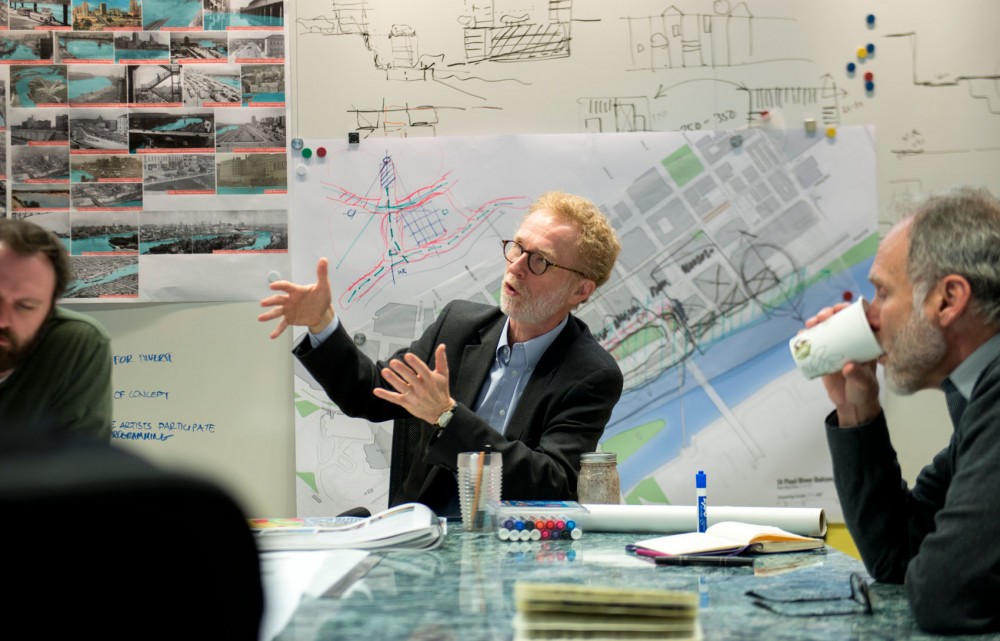When College of Design Dean Tom Fisher leaves his position and moves out of his Rapson Hall office this summer, he won’t have to carry his things very far — his new workspace will be just a floor below the current one.
In June, Fisher will step down from his position as the dean of CDES after serving as a leader at the University of Minnesota for 19 years. Though Fisher will no longer head the college, he’ll continue making an impact at the University.
Fisher’s new role will be as the Dayton Hudson Land Grant Chair in Urban Design and director at the University’s Metropolitan Design Center, which focuses on making metropolitan communities more livable and sustainable.
While he holds a degree in architecture, Fisher’s primary focus is on urban design, which combines elements of civil engineering, urban planning and architecture.
Fisher, 61, said he’s enjoyed his many years as a dean at the University, but he’s excited to take on different challenges that will come with the new position, which allows him to focus more on teaching and community work.
The change in positions is somewhat experimental, he said.
“I think you can be a leader without a title,” Fisher said. “Too many people think leadership is about the power [and] the title, and I don’t think that’s true. I think leadership is about ideas and leadership is about relationship building. Anybody can do that.”
A constant among changes
Fisher has held the title of dean throughout his entire time at the University. He first came to the school as the dean of the now-nonexistent College of Architecture and Landscape Architecture.
In 2006, he oversaw the creation of CDES, which was formed by merging his college and the College of Design, Housing and Apparel.
Fisher was able to help connect two very different outlooks on design and played a critical role in combining the two departments, longtime friend and coworker Tom Meyer said. Meyer currently serves on CDES’ advisory board and is an architect at MSR Architecture, Interiors, and Urban Design.
Meyer said Fisher’s leadership style helped facilitate the transition and that the dean has been a terrific asset for the college.
“I think his leadership strength comes from uncontained enthusiasm,” he said.
Renée Cheng, associate dean of research in CDES, said Fisher excels at connecting people, especially since the school he leads has so many different disciplines. The College of Design is currently housed on both the East Bank and the St. Paul campuses.
Cheng said she’s inspired by Fisher’s energy for design and higher education, and his new position at the University will allow him to continue doing the work he excels at.
Vice Provost and Dean of Undergraduate Education Bob McMaster, who teaches a course on geodesign with Fisher, said along with being an engaging and forward-thinking administrator, the dean is also a great teacher and has good relationships with students.
“Everything he does is highly successful,” McMaster said.
Fisher said he has enjoyed teaching throughout his time in academia, as it allows him to constantly learn and be inspired by his students.
“To spend your days with people who are all thinking and are excited about the future and what the future could be is a fun thing,” he said.
And in a University with high leadership turnover, Fisher has remained a constant. In his time at the school, Fisher said he’s seen four different presidents and multiple provosts lead.
“I realized it was probably time for me to step down when I was sitting in meetings, and I was looking around the table at my dean colleagues, and I realized everyone around the table is the third or fourth dean that I’ve worked with,” he said.
Fisher said the switch in positions will be a good change of pace and will allow him to spend more time with his family.
He’ll also be busy working on his 10th book, which will be published next spring, and adding to his list of academic and professional writing.
While his new position will be similar to the work he’s been doing for the last two decades, there will be some significant changes.
“I’ll have many fewer meetings,” he said.


